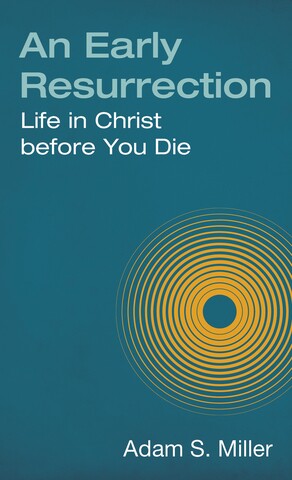Eternal life is the promise that death is not the end, that there is life after death. It’s the promise that both my body and this world can continue after death in the presence of God. And this promise matters. As Paul says, “If in this life only we have hope in Christ, we are of all men most miserable” (1 Corinthians 15:19). But the reverse is also true. If for the next life only I have hope in Christ, I am also lost. By itself, even the glory of an eternal life is not enough.
Learning to Love to a New Level
Without losing sight of eternal life, Paul calls this nearer mortal hope “life in Christ.” For Paul, to be a Christian in this world is to be in Christ. As a Christian I must hope in Christ (1 Corinthians 15:19), rejoice in Christ (Philippians 3:3), have faith in Christ (Galatians 3:26), be wise in Christ (1 Corinthians 4:10), speak the truth in Christ (Romans 9:1), pray in Christ (2 Corinthians 5:20), be created in Christ (Ephesians 2:10), love in Christ (2 Timothy 1:13), triumph in Christ (2 Corinthians 2:14), sleep in Christ (1 Corinthians 15:18), trust in Christ (Ephesians 1:12), be one in Christ (Galatians 3:28), find consolation in Christ (Philippians 2:1), and, of course, live in Christ (Romans 8:2). Everything I do, I must do it in Christ.
This “in” is decisive. It’s the difference between life and death. It’s the difference between wanting love and being in love. Something changes when you are in love. It’s not just that a new person is added to your life, one person among many. It’s that this new person changes for you what it means to be alive. Life is no longer just lived. Now, life is lived in love. You may keep the same job, have the same friends, and eat the same food, but something basic about why you do these things, or even how you do them, will have changed. This difference may be obvious or subtle, but it will certainly be deep. In love, life as a whole feels different. You see what you didn’t used to see. You hear what you didn’t used to hear. You care for things you’d ignored. You become capable of doing things that, last week, you weren’t able to do.
Life in Christ is like this. In Christ, the way I live—my manner of living—is changed from the inside out. Like being in love, living in Christ changes what it means to be alive. Living in Christ, I carry myself differently. I desire differently. I love differently. I greet pain and loss differently. I fail differently. I succeed differently. I part with the past differently. I respond to the present differently. I look to the future differently. In Christ, I hold time itself in a very different way.
Living Time in a Different Way
In the end, this last difference is the biggest. Life is made out of time. To live a different kind of life in Christ is to live time itself in a different way. Living in Christ, I discover a new way of being in time. In Christ, I repent. The past no longer owns me, the present isn’t held at arm’s length, and the future stops undermining me. Instead of waiting for Christ, I find that Christ is already given. I wake up to discover what was true all along, that Christ is “not far from every of one of us: for in him we live, and move, and have our being” (Acts 17:27–28).
This, at root, is what life in Christ looks like. Life in Christ turns on a new way of handling time. Rather than just storing up salvation for the future, life in Christ saves my life as I’m living it. In Christ, the veil grows thin and eternity starts bleeding into time. The next life, a life lived in the presence of God, gets underway before I’ve even died. . . .
In Christ, it’s possible to die while you’re still alive. And having died early, it’s possible for your resurrection to begin before you’ve even left this world.
In Christ, time’s grip loosens and things start happening out of order. This is what a Christian life looks like: you’re born, you’re buried with Christ, your resurrection begins, and then you die. If Christ has his way, we’ll all die before we’re dead and every one of us will yield our lives, here and now, to an early resurrection. . . .
In this sense, resurrection isn’t only for the next life. It’s meant, all the more, for my troubled present. If I insist on postponing my death, then I also insist on postponing my redemption. But if I’m willing to let those selfish parts of me die now—long before my body fails and my heart stops—then Christ’s resurrection can also begin to take hold of my body now. I can share in Christ’s life in this world and in this flesh. . . .
Get more thought-provoking insights from Adam S. Miller in An Early Resurrection.
Along with Nephi, "we talk of Christ, we rejoice in Christ, we preach of Christ," (2 Nephi 25:26) but in all our talking and learning, have we learned how to live in Christ? What does a life in Christ look like—or feel like?
In this thought-provoking exploration of the writings of the Apostle Paul and Book of Mormon prophets, Adam Miller examines what life in Christ looks like. How can we let ourselves and our own desires die so we can be born again to a new life, a full life in Christ, here and now in this mortal life?
Embark with the author on this journey—at once scriptural, philosophical, and literary—and discover one way to share a life with Christ as if he were present today.
Obtaining an Early Resurrection
What does the onset of an early resurrection feel like? What does it feel like to live in Christ, here and now? What does it feel like to hold time in a new way? What does it feel like to find eternity already pushing into the present?
Life in Christ has a certain feel. It’s not just an idea. It doesn’t just change how I think. Life in Christ goes deeper than this. It’s in my body, my heart, my lungs, my muscles and blood and bones. It glows like a burning coal in my belly. Life in Christ feels like being alive. It feels—in all its ordinary sensitivity, difficulty, and complexity—like what being alive feels like.
What, then, makes life in Christ different from just being alive? Almost nothing. The difference is that, alive in Christ, I stop looking beyond my life for something other than life. I stop looking past my life for something special or mysterious. I stop being blind to the life I’m already living. What Jacob says about scripture is even more true about life: “Wherefore, because of their blindness, which blindness came by looking beyond the mark, they must needs fall; for God hath taken away his plainness from them, and delivered unto them many things which they cannot understand, because they desired it” (Jacob 4:14). In Christ, I stop desiring what I can’t understand, I stop looking beyond the mark, and, as a result, what is plain and precious (my “plain old life”) is no longer hidden from me.
The difference between being alive and being alive in Christ is like the difference between seeing things in the light and seeing the light that lets me see things. In either case, both the things and the light are the same. But, in the second case, things couldn’t look more different. God is trying to give me the light itself—so plain, so obvious, so ordinary—but I’m running around at noonday looking for some special thing in the light, blind to the light. Christ, as the light of the world, is hidden in plain sight.
It’s true that, even when I am blind to Christ, I am already alive and feeling. But, alive in Christ, I finally start to feel what feeling alive feels like. When this happens, I stop trying to think that Christ is real and I feel that he is. A testimony takes root when I feel Christ in my flesh. It takes root when I feel Christ in the same way I feel, without thinking, which direction is up or whether ice is cold. It happens when I feel Christ immediately, viscerally, a notch or two deeper than my mind.
Becoming Alive in Christ
As a practical matter, much of life in Christ boils down to learning this one thing: how to feel, rather than flee, these feelings. All the basic things we do in the church—prayer, scripture study, sacrament meeting, visiting teaching, temple attendance—are meant to cultivate this sensitivity. Living in Christ, I become sensitive to the feel of life, to the feel of the Spirit, as it passes through my body. This feeling is both familiar and strange. It is both ordinary and divine. As Parley Pratt describes it, Spirit has just this effect. It resurrects my flesh, clears my mind, and opens my senses:
"The gift of the Holy Spirit adapts itself to all these organs or attributes. It quickens all the intellectual faculties, increases, enlarges, expands and purifies all the natural passions and affections; and adapts them, by the gift of wisdom, to their lawful use. It inspires, developes, cultivates and matures all the fine toned sympathies, joys, tastes, kindred feelings and affections of our nature. It inspires virtue, kindness, goodness, tenderness, gentleness and charity. It developes beauty of person, form and features. It tends to health, vigour, animation and social feeling. It developes and invigorates all the faculties of the physical and intellectual man. It strengthens, invigorates, and gives tone to the nerves. In short, it is, as it were, marrow to the bone, joy to the heart, light to the eyes, music to the ears, and life to the whole being" (Parley P. Pratt, Key to the Science of Theology (Liverpool: F. D. Richards, 1855), 98–99).
Driving for days, I can forget that I’m driving. I can get lost in my head for hours on end, locked in loops of worry and fantasy, until something jars me back into the present and back into the driver’s seat. Who was driving the car all that time? Who changed lanes? Who braked? How much of my life have I lived like this, pale and inattentive? How long have I gone without Spirit, dazed and desensitized? Hours? Days? Weeks? Have I mishandled time for years on end? How much of my life has, without Christ, slipped by unlived? How rarely do I manage to see the light?
Open to life and sensitized by Spirit, I stop daydreaming and remember that I’m already alive. I remember to feel that I’m alive. In Christ, I return to the present and discover, in being present, the presence of God. Filled with the Spirit, I get a local dose of Christ’s resurrection.
Lead image from Getty Images
Get more thought-provoking insights from Adam S. Miller in An Early Resurrection.
Along with Nephi, "we talk of Christ, we rejoice in Christ, we preach of Christ," (2 Nephi 25:26) but in all our talking and learning, have we learned how to live in Christ? What does a life in Christ look like—or feel like?
In this thought-provoking exploration of the writings of the Apostle Paul and Book of Mormon prophets, Adam Miller examines what life in Christ looks like. How can we let ourselves and our own desires die so we can be born again to a new life, a full life in Christ, here and now in this mortal life?
Embark with the author on this journey—at once scriptural, philosophical, and literary—and discover one way to share a life with Christ as if he were present today.



